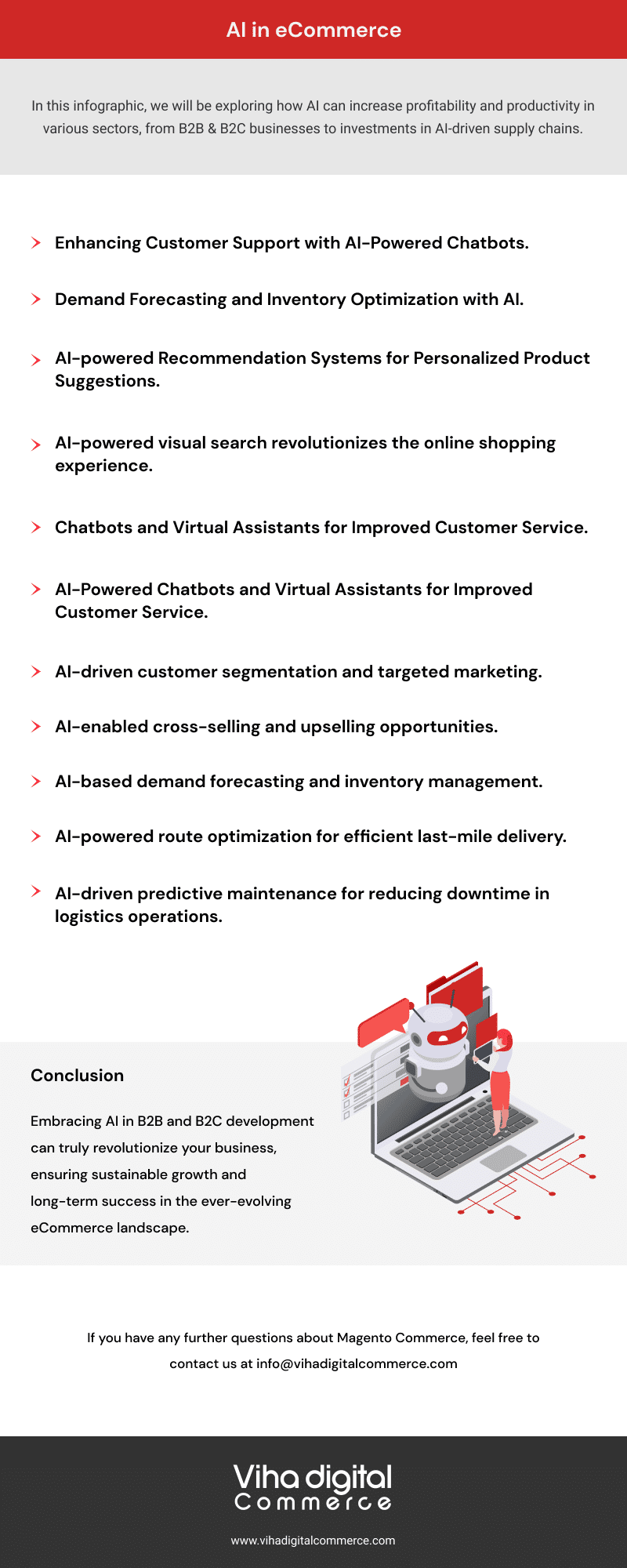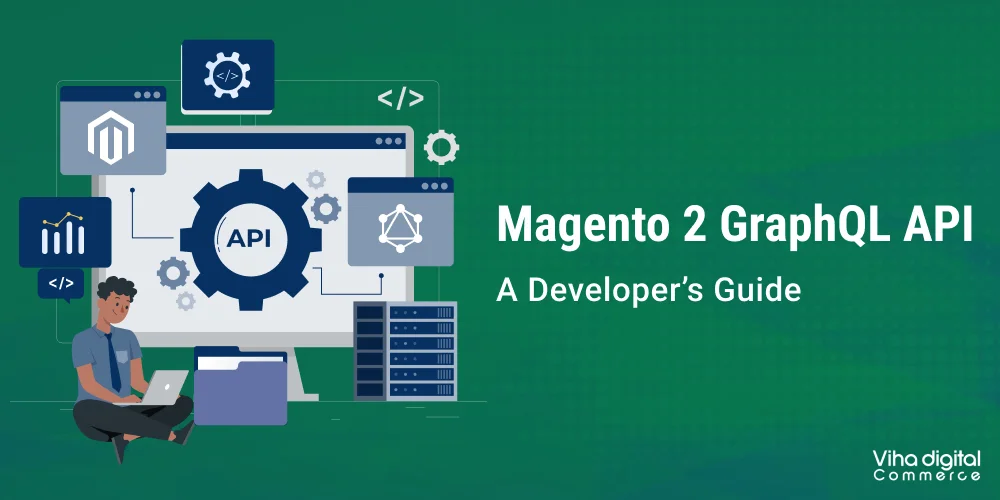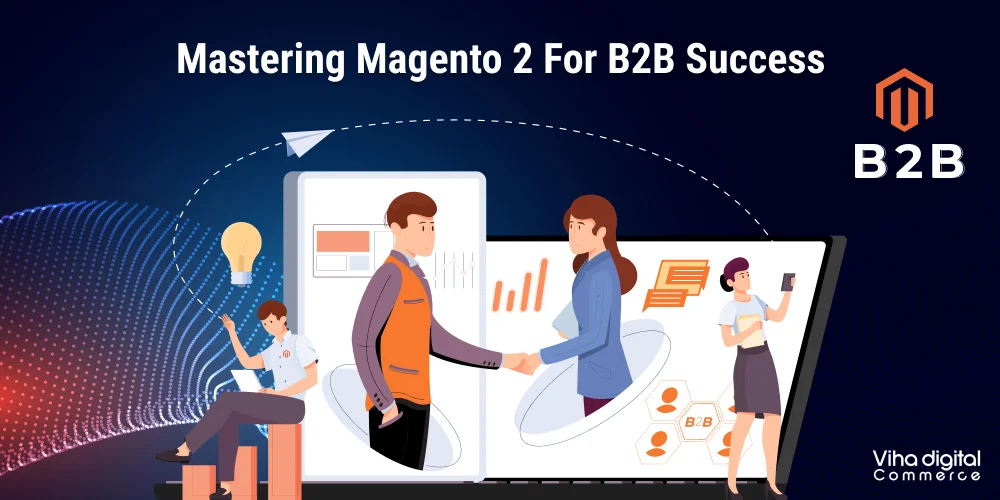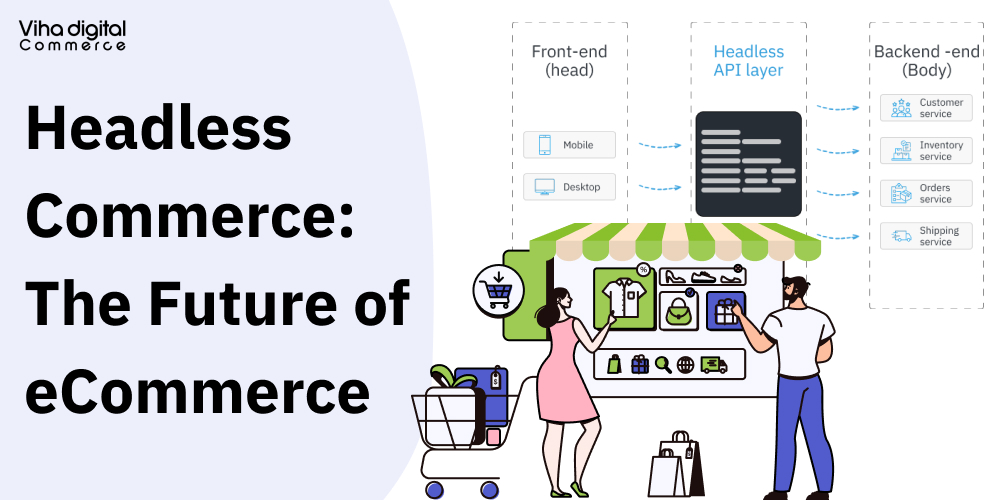
AI in eCommerce
In today’s fast-paced digital economy, eCommerce is becoming an essential part of how we interact with the world. Businesses now more than ever are striving to stay ahead of the competition and maximize efficiency and profits. To facilitate these goals they are turning to AI; a transformative technology that has embraced the eCommerce industry in a powerful way. Its potential to streamline processes, analyze large datasets and offer personalized service to customers has made it an indispensable tool for merchants worldwide.
In this blog, we will be exploring how AI can increase profitability and productivity in various sectors, from B2B & B2C businesses to investments in AI-driven supply chains. We will examine expert examples of where this technology has been successfully implemented, elucidating its advantages at each step along with its power to further unlock untapped potential for any and all businesses that adopt it. Get ready – let’s explore the world of AI eCommerce!

1. The Role of AI eCommerce in B2B eCommerce
In the realm of business-to-business (B2B) eCommerce, where transactions take place between companies rather than individual consumers, the integration of Artificial Intelligence (AI) has proven to be a game-changer. AI brings a multitude of benefits to B2B eCommerce, ranging from improved personalization and customer experience to streamlined inventory management and supply chain optimization. Let’s explore these benefits in more detail through two compelling case studies.
Case Study 1: Enhancing Customer Support with AI-Powered Chatbots
Zalando, a prominent European fashion brand, has leveraged AI to enhance customer support in B2B transactions. Zalando’s chatbot, equipped with advanced AI capabilities, offers an innovative solution for tracking shipments and confirming orders. Traditionally, customers had to search through their emails for the shipping number and then visit the shipping company’s website to track their parcels. However, Zalando’s chatbot simplifies the process by automatically tracking shipments upon receiving the shipping ID. By automating this task, Zalando’s customer support team can dedicate their efforts to addressing more complex customer queries and issues. This AI-powered chatbot not only improves operational efficiency but also enhances the overall customer experience. (Reference: Zalando)
Case Study 2: Demand Forecasting and Inventory Optimization with AI
Danone Group, a renowned French food product manufacturer, implemented AI-driven machine learning systems to enhance demand forecasting and inventory optimization in their B2B sales. The company faced challenges in accurately predicting demand due to the short shelf-life of its fresh products and volatile market demands. To address these issues, Danone harnessed the power of AI and machine learning algorithms. The implementation of the machine learning system led to significant improvements in demand forecasts, enabling more precise planning across various departments, including sales, supply chain, finance, and marketing. Consequently, Danone achieved greater efficiency and balance in its inventory management, ensuring they met their target service levels for channel and store-level inventories. This successful integration of AI not only optimized operations but also facilitated seamless coordination between different functional areas within the organization. (Reference: Danone Group)
These case studies exemplify how AI is revolutionizing B2B eCommerce. Through the implementation of AI-powered chatbots through the help of B2B Magento Developers, businesses can streamline customer support processes, freeing up valuable resources for more complex customer interactions. Additionally, leveraging AI for demand forecasting and inventory optimization enables companies to make data-driven decisions, reducing costs, and improving overall operational efficiency.
In the ever-evolving world of B2B eCommerce, embracing AI technologies opens doors to enhanced productivity, increased customer satisfaction, and improved profitability. As more companies recognize the transformative potential of AI, its integration into B2B eCommerce is expected to become increasingly prevalent, paving the way for a future where businesses can unlock new levels of efficiency and competitiveness.
2. AI E Commerce’s Impact on B2C eCommerce
B2C eCommerce, which stands for business-to-consumer, is a dynamic and rapidly growing sector of online commerce. It involves businesses selling products or services directly to individual consumers. In this digital age, Artificial Intelligence (AI) has emerged as a powerful tool that significantly enhances the efficiency and profitability of B2C eCommerce. Let’s explore the various ways in which AI is transforming the B2C landscape, with specific examples.
Example 1: AI-powered Recommendation Systems for Personalized Product Suggestions
One of the key ways AI enhances B2C eCommerce is through the implementation of recommendation systems. AI algorithms analyze vast amounts of customer data, including purchase history, browsing behavior, and demographics, to deliver personalized product suggestions. These recommendations are based on individual preferences, increasing the chances of conversions and driving customer satisfaction. By leveraging AI-powered recommendation systems, businesses can offer a tailored shopping experience, improving customer engagement and ultimately boosting sales.
Case Study 1: AI-powered visual search revolutionizes the online shopping experience
FoodDirect.com, an online grocery store, implemented an AI-powered visual search feature to revolutionize the online shopping experience. Visual search technology allows customers to take a picture or upload an image of a product they want to purchase. The AI algorithms analyze the image, identify the product, and provide relevant search results. This feature eliminates the need for customers to describe the product in words, making the search process more convenient and accurate. By leveraging AI for visual search, FoodDirect.com enhances user engagement and simplifies the path to purchase. (Reference: Food Direct)
Example 2: Chatbots and Virtual Assistants for Improved Customer Service
Another area where AI makes a significant impact in B2C eCommerce is customer service. Chatbots and virtual assistants powered by AI algorithms can handle customer inquiries, provide instant support, and assist with various tasks. These AI-driven conversational agents are available 24/7, ensuring prompt responses to customer queries. They can offer personalized recommendations, track orders, and even process simple transactions. By integrating chatbots and virtual assistants, businesses can enhance their customer service capabilities, reduce response times, and provide a seamless shopping experience.
Case Study 2: AI Powered Chatbots and Virtual Assistants for Improved Customer Service
Uber, the global ride-sharing platform, utilizes AI-driven pricing optimization to implement dynamic pricing strategies in their B2C sales. AI algorithms analyze real-time data on factors such as demand, supply, and external events to determine the optimal pricing for rides. This dynamic pricing approach allows Uber to adjust prices based on market conditions, ensuring efficient allocation of resources and maximizing revenue. By leveraging AI for pricing optimization, Uber demonstrates how businesses can adapt their pricing strategies in real-time, improving profitability while meeting customer demand. (Reference: Bloomberg)
These real-world examples highlight the transformative impact of AI in B2C eCommerce. From AI-powered visual search to dynamic pricing optimization, businesses are leveraging AI technologies to deliver personalized experiences, improve customer service, and optimize profitability. As AI continues to evolve, its integration in B2C eCommerce will become increasingly pervasive, shaping the future of online shopping and driving innovation in the industry.
3. Unlocking the Potential of B2B2C eCommerce with AI eCommerce
B2B2C eCommerce refers to a business model where a company serves as an intermediary between businesses (B2B) and end consumers (B2C). It allows businesses to offer their products or services directly to consumers, leveraging partnerships with other businesses. This model provides significant opportunities for growth and expansion by tapping into a wider customer base and creating additional revenue streams.
Benefits of integrating AI into B2B2C eCommerce
Integrating AI into B2B2C eCommerce can unlock numerous benefits for businesses. Here are two examples:
Example 1: AI-driven customer segmentation and targeted marketing
AI algorithms can analyze vast amounts of customer data to identify patterns and behaviors, enabling businesses to segment their B2B2C customer base more effectively. By understanding customer preferences and needs, businesses can personalize their marketing strategies and deliver targeted promotions, leading to higher conversion rates and customer satisfaction. For instance, Ad-Flex Communications, a marketing agency, utilized AI to predict winning creative concepts for future client campaigns. By analyzing historical data and consumer insights, they achieved significant improvements in campaign performance and client satisfaction.
Case study 1: Ad-Flex Communications – AI-driven customer segmentation and targeted marketing
Ad-Flex Communications, a marketing agency, implemented AI-powered predictive analytics to identify winning creative concepts for their client’s campaigns. By analyzing vast amounts of data, including customer behavior and historical campaign performance, they accurately predicted the most effective creative concepts. This AI-driven approach resulted in improved campaign outcomes, increased customer engagement, and enhanced ROI.
Example 2: AI-enabled cross-selling and upselling opportunities
AI can analyze customer purchase history, preferences, and browsing behavior to identify cross-selling and upselling opportunities. By recommending complementary or upgraded products to customers, businesses can increase average order value and customer lifetime value. Amazon is a prime example of effectively implementing cross-selling and upselling. Through phrases like “You might also be interested in…” or “Most customers buy these products together,” they suggest relevant items to customers, enhancing their shopping experience and driving additional sales.
Case Study 2: Amazon – AI-enabled cross-selling and upselling opportunities
Amazon, a global eCommerce giant, utilizes AI algorithms to effectively implement cross-selling and upselling strategies. By analyzing customer purchase history and preferences, Amazon recommends complementary products to customers, increasing the likelihood of additional purchases. This AI-driven approach has led to higher average order values, increased customer satisfaction, and improved revenue streams.
By integrating AI into B2B2C eCommerce such as Magento B2B2C, businesses can unlock the potential for targeted marketing, personalized customer experiences, and increased sales. The examples of Ad-Flex Communications and Amazon demonstrate how AI can drive growth and success in the B2B2C eCommerce model.
4. Enhancing Supply Chain Efficiency with AI eCommerce
The supply chain plays a crucial role in the success of eCommerce businesses. It encompasses all the processes involved in getting products from manufacturers or suppliers to customers. Efficient supply chain management ensures timely order fulfillment, reduces costs, and enhances customer satisfaction.
Ways AI optimizes supply chain operations
AI offers transformative capabilities that can revolutionize supply chain operations. Here are two examples of how AI optimizes supply chain efficiency:
Example 1: AI-based demand forecasting and inventory management
AI-powered algorithms can analyze vast amounts of historical sales data, market trends, and external factors to accurately forecast demand. By leveraging this predictive capability, businesses can optimize inventory levels, minimize stockouts, and reduce excess inventory. This leads to improved order fulfillment, reduced carrying costs, and increased customer satisfaction.
Case Study 1: United States Cold Storage (USCS) – AI-based demand forecasting and inventory management
USCS, one of the largest cold chain companies in warehousing and logistics, implemented an Intelligent Appointment Scheduler powered by predictive AI. This solution automated the truck appointment process across their 26 warehouses, resulting in significant operational improvements. USCS saved $1.2 million by reducing warehouse dock congestion, decreasing turnaround time by 15%, and improving customer service by 86%. This example showcases how AI can enhance supply chain visibility, optimize resource allocation, and reduce fulfillment costs.
Example 2: AI-powered route optimization for efficient last-mile delivery
Last-mile delivery is often the most challenging and costly aspect of the supply chain. AI algorithms can analyze real-time data such as traffic patterns, weather conditions, and delivery constraints to optimize route planning. By identifying the most efficient routes and dynamically adjusting delivery schedules, AI can minimize transportation costs, improve delivery speed, and enhance overall customer experience.
Case study 2: AI-driven predictive maintenance for reducing downtime in logistics operations
A manufacturing company in the United States utilized an AI-based predictive maintenance solution to monitor and analyze engine performance data across its fleet of trucks. By leveraging AI algorithms, the company could anticipate potential mechanical issues before they occurred, enabling proactive maintenance. This approach significantly reduced downtime caused by unexpected breakdowns, allowing the company to operate its trucks efficiently and cost-effectively. This case study demonstrates the power of AI in preventing costly repairs, maximizing asset utilization, and maintaining operational continuity.
By harnessing the potential of AI Ecommerce in supply chain management, eCommerce businesses can achieve higher operational efficiency, cost savings, and improved customer satisfaction, thereby unlocking significant value in their operations.
The Bottom Line
In conclusion, we have explored the remarkable power of AI eCommerce and its ability to enhance efficiency and profitability. AI has become a game-changer in the industry, revolutionizing various segments such as B2B, B2C, B2B2C, and supply chain management. By leveraging AI-driven technologies and strategies, businesses can unlock new opportunities and stay ahead of the competition. From AI-based demand forecasting and inventory management to personalized customer segmentation and targeted marketing, AI enables businesses to optimize operations, deliver exceptional customer experiences, and drive revenue growth. At Viha Digital Commerce, as a leading Magento B2B development service provider and Magento B2B2C expert, we recognize the transformative potential of AI eCommerce. We strive to empower businesses with cutting-edge AI solutions that elevate their eCommerce capabilities and unlock the full potential of their online presence. Embracing AI in B2B and B2C development can truly revolutionize your business, ensuring sustainable growth and long-term success in the ever-evolving eCommerce landscape.







